
THEORETICAL FOUNDATIONS OF CHEMICAL ENGINEERING
Scope & Guideline
Advancing the Frontiers of Chemical Theory
Introduction
Aims and Scopes
- Chemical Process Modeling and Simulation:
Focuses on developing and applying mathematical models to simulate chemical processes, including reaction kinetics, transport phenomena, and thermodynamic behavior. - Separation Technologies:
Explores various separation techniques, including distillation, extraction, and chromatography, emphasizing theoretical foundations and optimization strategies. - Material Science and Nanotechnology:
Investigates the synthesis and characterization of novel materials, including nanocomposites and catalysts, with applications in chemical processes. - Sustainable Chemical Engineering:
Addresses environmental and sustainability issues in chemical engineering, including waste treatment, resource recovery, and green chemistry practices. - Heat and Mass Transfer:
Examines the principles and applications of heat and mass transfer in chemical processes, focusing on enhancing efficiency and effectiveness. - Computational Methods in Chemical Engineering:
Utilizes advanced computational techniques, including CFD and AI, to analyze and optimize chemical engineering processes.
Trending and Emerging
- Deep Eutectic Solvents:
Research on deep eutectic solvents is gaining traction due to their potential as green solvents for extraction processes and their applications in various chemical reactions. - Artificial Intelligence and Machine Learning Applications:
The integration of AI and machine learning in optimizing chemical processes and modeling is becoming increasingly prominent, highlighting the industry's shift towards data-driven approaches. - Bioprocess Engineering:
There is a growing focus on bioprocesses, including fermentation and biocatalysis, reflecting the rising interest in sustainable and renewable resources. - Nanomaterials in Catalysis:
The use of nanomaterials and nanotechnology in catalytic processes is trending, showcasing innovations that enhance reaction rates and selectivity. - Process Intensification:
Research on process intensification techniques, such as microreactors and integrated processes, is emerging as a key area, aimed at improving efficiency and sustainability in chemical manufacturing.
Declining or Waning
- Traditional Chemical Engineering Processes:
There is a noticeable decrease in publications focused solely on conventional chemical engineering processes, suggesting a shift towards more innovative and interdisciplinary approaches. - Basic Thermodynamics:
Papers centered on fundamental thermodynamic principles are becoming less frequent as the field moves towards more complex and applied thermodynamic studies. - Classical Separation Techniques:
Research on classical separation methods like simple distillation is waning, with a preference for advanced techniques that incorporate modern technologies and materials. - Chemical Process Safety:
While safety remains critical, the specific focus on traditional chemical process safety methodologies has diminished in favor of broader environmental and sustainability considerations. - Single-Phase Flow Dynamics:
Studies dedicated exclusively to single-phase flow dynamics are less common, as research increasingly incorporates multi-phase and complex flow scenarios.
Similar Journals
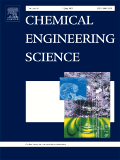
CHEMICAL ENGINEERING SCIENCE
Transforming Ideas into Solutions for a Sustainable FutureChemical Engineering Science is an esteemed journal published by Pergamon-Elsevier Science Ltd, dedicated to advancing the field of chemical engineering through high-quality research and innovation. With a storied history spanning from 1951 to 2025, this journal is recognized as a leading platform for disseminating cutting-edge studies, encompassing a diverse range of topics within chemical engineering, applied mathematics, and industrial engineering. Notably, it holds a prestigious Q1 ranking in several categories, including Chemical Engineering and Industrial and Manufacturing Engineering, indicating its significant impact and influence in these fields. The journal is not open access, yet it maintains a robust readership and is widely cited in academic circles, reflecting its vital role in shaping modern engineering practices. As a vital resource for researchers, professionals, and students alike, Chemical Engineering Science continues to bridge theoretical concepts and practical applications, fostering a deeper understanding of the complex challenges in chemical processes and manufacturing.
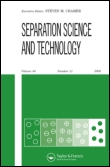
SEPARATION SCIENCE AND TECHNOLOGY
Innovating Techniques for Tomorrow's ChallengesSEPARATION SCIENCE AND TECHNOLOGY is a distinguished journal published by Taylor & Francis Inc, offering critical insights and advancements in the fields of chemistry and chemical engineering. With an ISSN of 0149-6395 and E-ISSN of 1520-5754, the journal spans a rich history from 1978 to 2024, providing a platform for scholarly articles that delve into innovative separation processes and technologies. Notably recognized in the 2023 category quartiles, the journal ranks Q2 in Chemical Engineering and Chemistry, alongside Q3 in Filtration and Separation and Process Chemistry and Technology, reflecting its significant impact and relevance in these research areas. With an impressive Scopus ranking, including a rank of #10/19 in Filtration and Separation, SEPARATION SCIENCE AND TECHNOLOGY is crucial for researchers and professionals seeking to enhance their understanding of separation techniques and applications. Although it operates under a subscription model, its contributions remain indispensable for the advancement of knowledge and technologies in separation science.
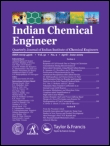
Indian Chemical Engineer
Elevating Standards in Chemical Engineering Research.Indian Chemical Engineer, published by Taylor & Francis Ltd, stands as a reputable journal in the field of chemical engineering, encompassing a wide range of topics pertinent to both academia and industry. With an ISSN of 0019-4506 and an E-ISSN of 0975-007X, this journal has been a key resource for researchers and professionals since its inception in 1992, undergoing a significant evolution from 2009 to 2024. Currently ranked in the Q3 category of chemical engineering (miscellaneous) in 2023, it reflects a dedicated commitment to disseminating innovative research and insights within the discipline. The journal is indexed in Scopus, achieving a rank of 148 out of 273, which denotes its growing influence in the field with a 45th percentile placement. Although currently not an open-access publication, it offers valuable content that contributes extensively to the advancement of chemical engineering research and education. Researchers, professionals, and students alike are encouraged to engage with this publication to stay at the forefront of industry advancements and academic discussions.
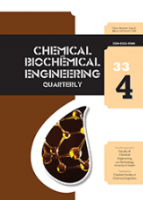
CHEMICAL AND BIOCHEMICAL ENGINEERING QUARTERLY
Empowering Researchers with Cutting-Edge InsightsCHEMICAL AND BIOCHEMICAL ENGINEERING QUARTERLY, published by the Croatian Society of Chemical Engineering Technology, is a distinguished open-access journal that has been providing a platform for the dissemination of innovative research since its inception in 1987. With a focus on the fields of biochemistry and chemical engineering, this quarterly journal addresses a wide array of topics, including process chemistry and technology, making significant contributions to both academia and industry. Despite its current positioning in the Q4 category for biochemistry and Q3 for miscellaneous chemistry and process chemistry in 2023, the journal continues to strive for greater impact, catering to researchers, professionals, and students alike. Its open-access model, in place since 2001, ensures that cutting-edge research is accessible to a broad audience, fostering collaboration and knowledge sharing within the scientific community. By promoting high-quality research and providing insights into the latest advancements, Chemical and Biochemical Engineering Quarterly remains an essential resource for those involved in the chemical and biochemical engineering disciplines.

KOREAN JOURNAL OF CHEMICAL ENGINEERING
Shaping Tomorrow’s Chemical Engineering Landscape.The Korean Journal of Chemical Engineering is a prestigious publication by the Korean Institute of Chemical Engineers, dedicated to advancing the field of chemical engineering and its associated sciences. Established in 1984, this journal has made significant contributions to the dissemination of innovative research, covering a broad spectrum of topics within chemical engineering and general chemistry. With a current impact factor placing it in the Q2 quartile within both the chemical engineering and chemistry categories, it is recognized for its rigorous peer-review process and high-quality articles. The journal provides a valuable platform for researchers, professionals, and students to share their findings and collaborate on emerging methodologies and technologies. Although it does not offer open access options, its broad international readership, bolstered by its Scopus rankings — including a commendable #108 in general chemical engineering — ensures widespread visibility and dissemination of published works. As it approaches its 40th anniversary in 2024, the Korean Journal of Chemical Engineering continues to be an essential resource for anyone engaged in the field, driving innovation and academic dialogue worldwide.
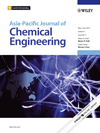
Asia-Pacific Journal of Chemical Engineering
Pioneering Sustainable Solutions for a Greener Tomorrow.The Asia-Pacific Journal of Chemical Engineering, published by WILEY, serves as a vital forum for the dissemination of innovative research in the interdisciplinary domains of chemical engineering, renewable energy, sustainability, and waste management. Established in 2006, this esteemed journal has achieved a notable impact factor that reflects its commitment to advancing knowledge and practices within the chemical engineering community. With its Q3 category rankings across various fields, including Chemical Engineering (Miscellaneous), Renewable Energy, Sustainability and the Environment, and Waste Management and Disposal, the journal holds a significant position among its peers, assuring readers of quality and relevance in published content. Although it does not offer Open Access options, the Asia-Pacific Journal of Chemical Engineering remains an essential resource for researchers, professionals, and students aiming to stay at the forefront of innovations affecting the Asia-Pacific region and beyond. The journal's broad scope covers diverse topics, making it an integral part of the academic landscape from 2006 to 2024.

Hemijska Industrija
Fostering Collaboration in Chemical ScienceHemijska Industrija, an esteemed journal published by the Association of Chemical Engineers of Serbia, serves as a critical platform for advancing knowledge in the fields of chemical engineering and chemistry since its inception in 1989. With an Open Access policy adopted in 2017, the journal provides global access to cutting-edge research and innovative findings, enhancing visibility for authors and fostering collaboration among researchers, professionals, and students alike. This peer-reviewed journal currently holds a Q3 ranking in both Chemical Engineering (miscellaneous) and Chemistry (miscellaneous) categories, signifying its growing impact in these fields. Published in Belgrade, Serbia, Hemijska Industrija not only disseminates high-quality articles from various disciplines within chemical science but also emphasizes interdisciplinary approaches and practical applications, making it an invaluable resource for anyone seeking to stay at the forefront of chemical innovations.

CHEMICAL AND PETROLEUM ENGINEERING
Empowering Research for a Sustainable FutureChemical and Petroleum Engineering is a prestigious academic journal dedicated to the advancement of knowledge in the fields of chemical engineering and petroleum technologies. Published by Springer, this journal serves as a vital resource for researchers, professionals, and students interested in the intricate processes and innovations that drive these industries. With an ISSN of 0009-2355 and an E-ISSN of 1573-8329, it has established a notable presence since its inception in 1965. Throughout its converged years, the journal has continually published impactful research that contributes to sustainability and efficiency within the sectors. Although it holds a Q3 ranking in Chemical Engineering and Fuel Technology and a Q4 ranking in Energy Engineering and Geochemistry, it is a noteworthy platform for emerging studies, fostering connections among scholars. Readers will find a wealth of information and ideas, but please note that this journal does not currently offer open access options. For those passionate about chemical and petroleum engineering, this journal is an essential part of staying informed and engaged with the latest scientific advancements.

Chemical Product and Process Modeling
Advancing the art of chemical engineering through innovative modeling.Chemical Product and Process Modeling is a vital academic journal published by WALTER DE GRUYTER GMBH, focusing on the intricate intersection of chemical engineering and mathematical modeling. Since its inception in 2006, this journal has been instrumental in disseminating significant research findings and methodologies that advance the modeling and simulation of chemical products and processes. With an ISSN of 1934-2659, it caters to a global audience from its base in Berlin, Germany. Although positioned within the Q3 and Q4 quartiles in Chemical Engineering and Modeling & Simulation categories respectively in 2023, it offers a platform for innovative approaches and contributions in these fields, making it a resource for researchers and industry experts alike. Access to the journal's content is offered through subscription models, enabling professionals and academics to stay abreast of the latest developments. In a rapidly evolving scientific landscape, Chemical Product and Process Modeling remains dedicated to enhancing knowledge and fostering collaboration within the chemical engineering community.
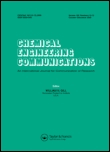
CHEMICAL ENGINEERING COMMUNICATIONS
Elevating Knowledge in Chemical Sciences Since 1973.Chemical Engineering Communications, published by Taylor & Francis Inc, is a distinguished journal within the realms of Chemical Engineering and Chemistry. With an ISSN of 0098-6445, this journal plays a pivotal role in disseminating innovative research, critical reviews, and insightful discussions that encompass a broad spectrum of topics in these fields. The journal boasts a commendable Q2 ranking in the 2023 category of chemical engineering and general chemistry, reflecting its significant contribution to the scientific community. Operating under a rigorous peer-review process, the journal attracts high-quality submissions from global researchers. Although currently not an Open Access journal, it provides extensive archive access for users interested in exploring past advancements from its inception in 1973 through to 2024. With a commitment to advancing knowledge and fostering collaboration among academia and industry, Chemical Engineering Communications remains an essential resource for professionals and students aiming to stay abreast of the latest developments in chemical sciences.